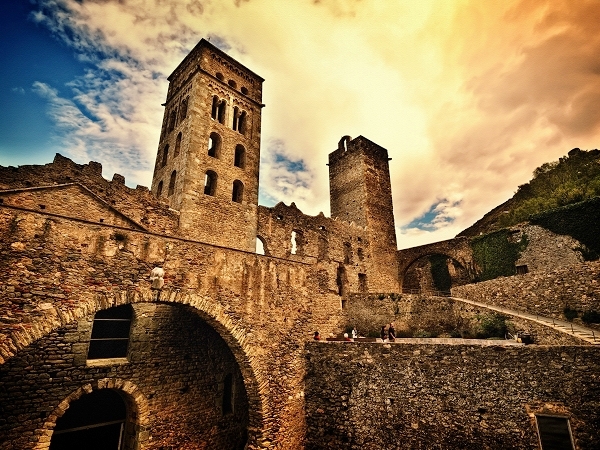In particularly difficult political or military situations,
在政治或者軍事情況極其困難的情形下
the Romans would naturally assume that some god or goddess had been offended.
羅馬人會自然地認為冒犯了某個神
The Roman's difficulties would continue,
他們認為,羅馬的困境會持續
they believed, until the offended deity had been identified, no small task, and won back into good graces.
除非被冒犯的神靈得到確認,這不是一項小工程贏回這位神的青睞。

As a rule, the Romans were open to the worship of other people's deities,
規則是羅馬人接受其他人的神靈
provided that these other people were willing to worship Roman deities.
只要這些人愿意信奉羅馬的神靈
The only exception was made in the case of religions,
唯一的例外是宗教
which seemed to go against the official Roman core values,
似乎和羅馬的官方價值觀相違背
such as the Bacchic ritual of Dionysus in the second century BC,
例如公元前二世紀的狄奧尼索斯的酒神儀式
and the Jewish grouping known as the Christians who emerged in the 1st century AD.
以及公元一世紀產生的基督教徒
We can speak of the Roman's religion as a state religion,
我們可以說羅馬人的宗教是國教
because it was run by the Roman state for the good of the Roman state.
因為它是由羅馬城邦國負責為了維護羅馬城邦國的利益
In the days of the monarchy, the king was a supreme priest of the religion, and appointed all of the other priests.
在君主制時期國王是宗教的最高祭祀負責任命其他的祭祀
In republican times, the chief priest or Pontifex Maximus was elected, as were the members of the other, lesser priesthoods.
在共和國時期祭司長或者Pontifex Maximus和其他成員一樣是選舉出來的較低級的祭祀也是選舉出來的
The magistrates of the Roman state also had the right to consult augurs, haruspices and other brands of fortune tellers, on behalf of the state.
羅馬的審判官有權參與占卜占卜師和其他的預言家代表羅馬
Practically from Rome's founding, kings
實際上,從羅馬建立以來
and then magistrates built huge temples to the great gods and goddesses, especially the Capitoline trio of Jupiter, Juno and Minerva.
國王和審判官為偉大的神建立了宏大的神廟特別是朱庇特神殿朱諾和密涅瓦的神廟
Each temple became the site of rituals enhancing the glory of the Roman state and the glory of the magistrate who built the temple.
每一座廟都變成了儀式地點促進羅馬的榮譽以及建立這些神廟的審判官的榮耀
Although the Roman state religion was a great unifying factor in Roman life,
盡管羅馬國教是生活中的團結因素
it failed the Roman people in one crucial respect.
但它在很重要的方面讓羅馬人失望
The Roman gods and goddesses didn't care about humans.
羅馬的眾神不在乎人類
So there seemed to be no reason for human existence.
因此,人類的存在似乎沒有原因
Just be a good Roman, do your duty, don't ask questions and the Roman religion offered no hope of a satisfactory afterlife.
做一個好羅馬人,履行你的職責不要問問題,羅馬宗教沒有給人們滿意的來世的希望
Greco-Roman myths of the afterlife traditionally offered lots of depressing details,
希臘羅馬關于來生的神話通常都令人沮喪
but no reason to live and very little comfort about what might happen afterwards.
沒有繼續來世的希望來世的安慰很少
So the Roman people as a whole, would turn to other forms of worship to better meet their spiritual needs.
因為所有羅馬人都會轉向其它的崇拜以更好地滿足他們的精神需要
And this spiritual dissatisfaction with the Roman state religion
這種對羅馬國教的精神不滿足
only got deeper as society changed,
隨著社會的變革而加深
but the religious rituals remained static, static, static. Stop.
但是宗教儀式依舊不變,不變,不變,停止
Segment 7d: Wars and Peaces.
7d戰爭與和平
From the beginning of Roman times,
羅馬時代從一開始
military service was not an obligation for citizens,
兵役都不是公民的義務
it was a privilege.
而是一種殊榮
Only citizens who could afford their own weapons were allowed to serve.
只有買得起武器的公民能夠參軍
The more equipment and the better equipment a citizen could purchase,
一個公民能買到更多更好的裝備
the greater his role in the army, and the greater his political rights.
他在軍隊中的地位越高他的政治權利越大
It was assumed that those with the most money
假設那些有很多錢的人
could afford the best equipment, better equipped soldiers did more service to the Roman state, and therefore, the better equipped soldiers deserved more of a voice in Roman government.
買得起最好的裝備裝備更好的士兵更好地服務國家因此,裝備更好的士兵應該在政府中擁有更多話語權
The lowest proletarians fought with slings and rocks.
最低級的平民用吊索和石頭戰斗
The better off could fight with cheap swords and cheap armor.
裝備更好的使用的是便宜的劍和廉價的鎧甲。











